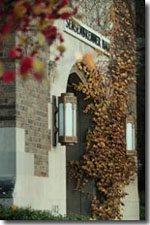| |
Marquette University Law School
Curriculum
Philosophy
It's not just what you do, but how you do it. The philosophy expressed
in that old dictum is at the core of what Marquette University Law School
describes as its "values-centered" approach to legal education. Besides
teaching students about substantive law, practice skills, and legal ethics
requirements, "we never want to forget that there are transcendent values,
including appropriate interactions among human beings," says dean Howard
Eisenberg. "I like to say that a lawyer's job is to resolve a client's
problem as quickly and inexpensively as possible, with as little acrimony
as possible. The client is foremost in the lawyer's mind, but the resolution
of the client's problem can be achieved without damaging other people."
 In
a time of much discussion - inside and outside the legal profession -
about lawyers' uncivil behavior on the job, Eisenberg says the law school
can plant the idea in students' minds that there is another way to be.
"First, you can give students permission to act differently," he notes.
"Then you can provide them with role models who act differently, and you
can conduct the institution differently." In
a time of much discussion - inside and outside the legal profession -
about lawyers' uncivil behavior on the job, Eisenberg says the law school
can plant the idea in students' minds that there is another way to be.
"First, you can give students permission to act differently," he notes.
"Then you can provide them with role models who act differently, and you
can conduct the institution differently."
At Marquette, communication skills are a key component of all core classes.
What's more, all students gain at least some exposure to alternative dispute
resolution (ADR), as all first-year courses incorporate hands-on ADR exercises.
"That's not to say there's no role for adversarial relationships," Eisenberg
points out, "but we want to inform students about the full plate of options
they have."
Beyond the first-year introduction to ADR, students can delve deeper
into the subject in seven focused courses. The ADR program is one of several
in which Marquette strives to be on the leading edge nationally. Others
include programs in intellectual property law, international law, and
sports law. "We've identified areas in which we've developed some of the
better programs in the country," Eisenberg says, "as opposed to trying
to do everything better than anyone else. And then we stick to the basic
concept of being a lawyer's law school. Our greatest strength is in providing
a sound, general legal education."
In addition to courses in diverse legal practice areas, Marquette offers
clinical programs that fall into three categories: legal clinics, judicial
internships, and supervised field work. "We have lots of resources in
Milwaukee, most of them within walking distance of the law school," says
Thomas Hammer, clinical programs director. "Not only do we have a substantial
number of federal and state government agencies and courts, but we also
have opportunities for students to render help to agencies that serve
the poor. That's in line with what we view to be the Jesuit mission of
the law school."
The four legal clinics all involve a classroom component, usually taught
by an adjunct professor who has a supervisory capacity at the field site.
These include the prosecutors and defenders clinics linked to the Milwaukee
County District Attorney Office and the Milwaukee office of the State
Public Defender. As of fall 2001, students also will be able to participate
in a new unemployment compensation advocacy clinic, to be offered in cooperation
with Legal Action of Wisconsin.
The fourth clinic option, a part of the ADR program, is a mediation
clinic developed by former Wisconsin Supreme Court Justice Janine Geske
when she joined the Marquette faculty in 1998. Students and their supervisors
head to the Milwaukee courthouse every Monday to mediate small claims
disputes. Instead of giving legal advice, the student mediators' role
is to bring parties to a mutually satisfactory agreement. "By the end
of the semester," Geske says, "students have had a rich experience not
only in learning to be good listeners and problem solvers, but also in
issues that involve humanity." Such skills, she adds, serve students well
no matter what type of practice they enter upon graduation.
Judicial internships place students in state and federal trial and appellate
courts in the Milwaukee area. The final category of clinical programs,
supervised field work, offers students experience in government legal
work or in agencies providing legal services to poor people - everything
from the Internal Revenue Service to the Catholic Charities Immigration
Assistance Project.
"I emphasize to our students that the clinical programs are a component
of their education," Hammer says, "but I don't elevate these above other
forms of instruction here. I view a sound legal education as including
traditional classroom courses, research seminars, lawyering skills classes,
and then clinical programs, which give students the opportunity to work
in a setting where lawyers and judges are doing the work of the law."
Who's
Getting In?
|
